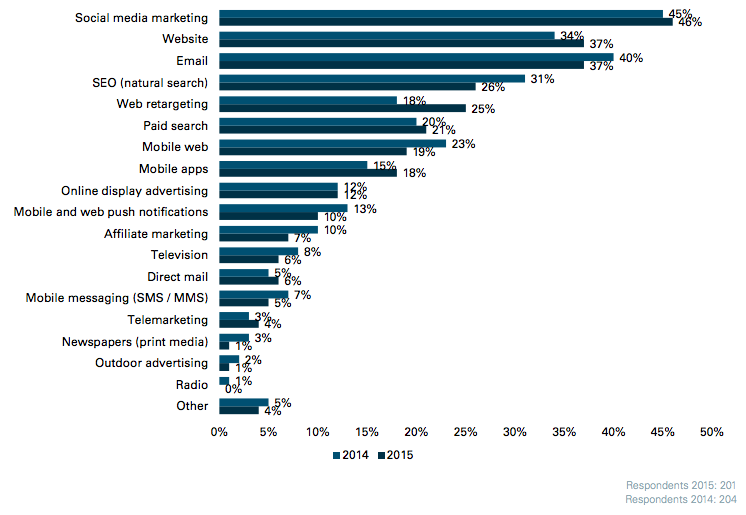
It’s hard to believe how many entrepreneurs have told me, “I don’t do marketing.” But it doesn’t stop there. I’ve also heard things, like:
-
I don’t have a website, and don’t need one.
-
I don’t need professional photos.
-
I only need word of mouth.
-
I want to grow 100% organically.
This generally comes from the early-stage entrepreneur (or solopreneur) camp and established businesses that are soon to become extinct.
Yet, whether you have a few customers or plenty (and you think these statements are valid) it is time to rethink your strategy. Especially if you hope to become profitable, grow your empire or simply thrive, instead of survive.
When marketing feels like a complete scam
If any or all of the bullet points above resonated with you, then it’s important to understand that these are limiting beliefs. It’s the result of a mindset that will prevent you from realizing your company’s full potential.
I know that there are zillions of experts and gurus out there that will tell you marketing is essential. Sometimes it can feel like a complete scam; especially if you’ve tried one marketing tactic and it didn’t give the results you were after. As a result, you’ve formed an inaccurate view of marketing as a whole and are set on growing “organically”.
Well, here’s the deal: marketing is important and it is something you can learn to do better over time and eventually master.
Here’s the thing about ‘organic’ growth
Ask yourself: “Why am I so set on growing ‘organically’ and what do I mean by that specifically?” What does organic growth mean to you? Does it mean:
-
growing a business without putting yourself out there,
-
not doing any paid advertising,
-
not paying for exposure at all,
-
growth by word of mouth only, or
-
growing your business without marketing?
If any or all of the above, why do you believe this is the right path? Dig deep into those deep-seated mental scripts you tell yourself about “organic” growth. Next, take a look at what “organic growth” actually means. By defintion it is “the process of business expansion by increased output, customer base expansion, or new product development, as opposed to mergers and acquisitions, which is inorganic growth.”
As you can see, organic growth really happens, but it requires practical measures and a process to make it happen. It’s a distinction between growth by putting in the work versus acquiring assets.
In fact, marketing is pretty much an underlying requirement to fulfill that process. I’m not saying it’s impossible to grow a business with word of mouth, but in today’s competitive climate, it’s highly improbable that one tactic alone will create the success you desire.
Why you need more than word of mouth
Established markets are already saturated. As human nature would have it, people are more likely to remember and share negative experiences than positive ones (not always the kind of word of mouth you’re looking for).
For perspective, “Marketers are expected to spend $540 billion globally on advertising this year, a 4.6% increase over 2014, according to a report by media-agency Carat.” Yes … billions. And you don’t spend billions doing something that doesn’t “work”.
This is where you can hopefully start to see the benefit of marketing?
Marketing is necessary (and here’s why)
Before I share why every business needs marketing, let’s get clear on what marketing actually is. According to the American Marketing Association (AMA), “Marketing is the activity, set of institutions, and processes for creating, communicating, delivering, and exchanging offerings that have value for customers, clients, partners, and society at large.”

It can be accomplished with a variety of tactics (as seen above). But marketing is beneficial for five reasons:
1. Marketing is a defensive strategy.
If you think you already have enough customers, think again! That may be the case for now, but what happens when a competitor sets up shop down the road? What happens when a trend you’ve capitalized on slows down in demand?
Even in smaller niche markets where you may have a perceived monopoly (think local coffee shops, bakeries, boutiques, etc.) you do have competition and sooner or later your bottom line will feel it.
If you own a coffee shop you are not only competing directly with other coffee shops, but with bakeries, convenience stores, grocery stores, and others who sell coffee. You can proactively combat competitive pressure by establishing a strong culture, a unique selling proposition and brand — and by marketing it effectively.
In this sense, marketing is simply communicating your offering effectively so people know about you and are encouraged and compelled to come to you rather than your competition.
2. Marketing helps increase your customer base.
A common goal of marketing is to attract new customers. When done correctly and effectively, potential customers will see your content and message over time and gain interest. With repetition, people start to recognize your brand, and perhaps are intrigued to learn more.
Couple this with a proper call to action and incentive, they could be encouraged to visit your website, follow you on social media or join your mailing list.
Your latest one-off marketing effort to attract new customers likely fell flat because you ignored a few key facts:
-
Marketing is about consistency and repetition
-
Most people don’t need what you’re offering when they first hear about you
-
You need to build trust before people will buy from you.
Instead, think through a marketing plan that:
-
continually introduces you to a pool of targeted leads (potential customers)
-
captures their information (lead conversion)
-
allows you to stay in contact with them and build a relationship over time until they have a need (lead nurturing), and
-
eventually leads to conversions (sales)
It doesn’t have to be complex, but it does need to be multifaceted and planned with a specific goal and targeted audience.
3. Marketing prompts customer loyalty.
Marketing can create repeat customers by contributing to your customer retention and sales goals. This form of marketing is about continually engaging past customers by offering value sharing a call to action that leads to repeat sales.
Customer loyalty campaigns can be accomplished through automated email campaigns, annual birthday or even holiday promotions. It can be as simple or complex as you require. The point is to create a marketing plan with ongoing tactics that communicates with past customers and aims to build ongoing relationships and revenue.
4. Marketing lifts brand recognition.
Is your business top of mind for people who are ready to purchase products or services that you sell? If so, you’ve benefited from brand recognition that ensures you are top of mind when a prospect is finally ready to buy.
For example, when your ideal customer Lisa thinks, “Gee…. Friday night is my friend Sarah’s birthday, and she loves Italian food. Which Italian restaurant has gluten free pasta?”— is your pizza shop a top of mind consideration?
If you’ve done your job effectively — the job of marketing and promoting your unique value, attracting interested parties, compelling them to take a desired action, and consistently creating value — then the next thought in Lisa’s head will be, “Oh yeah! Gianni’s Trattoria is perfect. I saw their Facebook page promoting gluten free pasta, read their testimonials on their website, saw the photos and she’ll love the vibe.”
That is the power of being top of mind — a result of consistent and relevant marketing efforts. Success is not merely about providing good customer service, an unique experience, a quality product, and then hoping people talk about it with their friends. It is about taking a proactive approach and not leaving success to chance.
5. Marketing establishes a market position.
When you become known for something your brand will start to speak for itself. You are viewed as an industry expert. You are known and remembered. You are a professional. This is ideal. Big brands know this, your competitors know this and marketing will get you there.
Your goal is to “occupy a clear, unique, and advantageous position in the consumer’s mind.”
Your market position will separate you from amateurs waiting in hopes a celebrity will tweet about their brand and sales will soar. Forging a solid market position is only accomplished because you’ve decided to reach out and claim it.
Building market share and earning a market position isn’t just for large enterprises. It’s perfectly okay if your market share is small and niche. You don’t have to appeal to everyone — just the right ones.
Play the long game with marketing
Marketing is what marks you as a professional in your industry, separating you from the newbies, amateurs, hobbyists and dreamers. It’s what will — if you have a viable business — give you the ability to grow your operation to the scale you want.
I know marketing can seem overwhelming — especially if you’re just starting out or an established business struggling to keep up with new opportunities. It can be daunting.
The key for you, as a smaller operation, is to apply and test marketing channels that larger companies use on a smaller scale. Take it one step at a time. This is a long game. It’s going to take resources (i.e., time, money, energy, thought, etc.) but once you find traction you’ll grow a more sustainable business.
This article has been edited and condensed.
Caylena Cahill, owner of CC Photo & Media, is a branding photographer and entrepreneur. She works with small businesses and entrepreneurs to develop a stand out visual brand that resonates and builds confidence and desire with her clients’ audiences. Connect with @ccahill1 on Twitter.
© YFS Magazine. All Rights Reserved. Copying prohibited. All material is protected by U.S. and international copyright laws. Unauthorized reproduction or distribution of this material is prohibited. Sharing of this material under Attribution-NonCommercial-NoDerivatives 4.0 International terms, listed here, is permitted.













